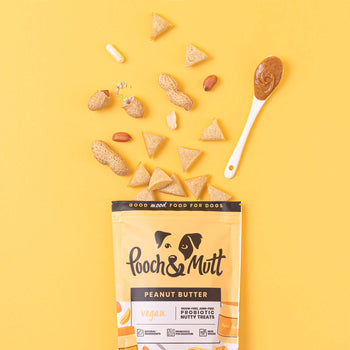The answer is yes, dogs can eat nuts - but only certain types, which should be fed in moderation. Nuts are a nutrient-rich natural snack for dogs (just like they are for humans), however, it’s crucial you know exactly which nuts are safe for your pup to eat, and which should be deemed a snack for you and us.
Are nuts good for dogs?
Though they’re not recommended as a regular food for dogs, nuts are high in nutrients and can be included as part of a well-rounded pooch diet.
High in fat, they must not be given to those who are overweight or prone to pancreatitis, and need to be fed in moderation.
What are the health benefits?
Here are some of the ways nuts can benefit your dog’s health.
-
Rich in healthy fats. Nuts include omega-3 and omega-6 fatty acids, which, in moderation, can promote a shiny coat and healthy skin.
-
Source of protein. Plant-based protein can support muscle development and overall body functioning (alongside meat protein).
-
High in vitamin E. A powerful antioxidant that helps to protect a dog’s cells from oxidative stress. It also supports a healthy immune system, skin, and eyes.
-
Dietary fibre. Nuts are a source of dietary fibre, which aids digestion and helps with firm poops and bowel regularity.
Can puppies eat nuts?
Nuts aren’t ideal for puppies, so it’s best to wait until they’re older. As a pup’s digestive system is still developing and very sensitive, nuts can be hard for their bodies to process. It’s also super important that they don’t eat any nuts with flavourings or tough bits that could make them choke. For now, stick to wholesome puppy food and puppy-safe treats.
When are nuts unsafe for dogs?
Nuts can be unsafe for dogs for a number of reasons, so it’s very important to serve the right nuts, which are prepared correctly.
- Check if the type of nuts is non-toxic to dogs. Macadamia nuts are toxic to dogs and must be avoided.
- Remove all outer shells, if present.
- The nuts must be unsalted and without any extra flavourings.
- Nuts which have mould must be strictly avoided.
- It’s dangerous and potentially fatal to feed your dog nuts if they have a nut allergy.

Can dogs be allergic to nuts?
Dogs can have nut allergies, but they are less common than in humans.
Symptoms occur when a dog’s immune system reacts to the proteins found in nuts, which triggers irritation or a reaction.
The severity of these reactions can vary; your pooch might simply become ill with:
- Vomiting
- Diarrhoea
- Gas or bloating
- They may get a skin reaction or rash
- More worryingly, they might have difficulty breathing or even go into anaphylaxis.
If you’re worried your dog might have a nut allergy, get them to a vet as soon as you notice any symptoms.
Can nuts make dogs sick?
Nuts have the potential to make dogs sick in a few ways - so it’s very important to prepare the nuts correctly.
- If the nuts aren’t fresh or if there is mould present, they could cause serious harm to your pooch if ingested, so they should be disposed of immediately.
- If your dog has a nut allergy, nuts can make them very sick.
- As nuts are high in fat and quite calorific, feeding your dog nuts too often or in large amounts can result in weight gain or even life-threatening illnesses such as pancreatitis. They should always be fed in moderation.
- Remove all the outer shells from nuts to avoid choking hazards.
- Flavoured or salted nuts can upset a dog’s sensitive stomach - only stick to plain, unsalted nuts that are ideally organic.
Can dogs eat nuts safely?
You can feed your dogs nuts in a safe way, so they get the nutrients they need without any of the inherent risks.
Keep it simple by choosing a safe, plain variety of nuts, without any extra flavourings or salt; removing any outer shells, and only giving them to your dog in moderation.
How many nuts can dogs eat?
Recommended portion sizes of nuts can vary based on your dog's size, breed and age.
To clarify, nuts should only be fed in small amounts, every now and then as a treat, rather than as a regular snack.
Small dogs should only eat 1 or 2 small nuts or nut pieces each time.
Larger dogs can have up to 5 small nuts or nut pieces.
Which nuts are toxic to dogs?
The following nuts aren’t recommended as a snack for dogs as they’re especially high in fat or harder for them to digest than other nuts.
- Pecans
- Almonds
- Walnuts
- Pistachios
- Brazil nuts
- Beech nuts
- Non-organic peanut butter that contains xylitol
Which nuts are safe for dogs to eat?
The following nuts are recommended varieties to give to your dog occasionally as a treat. Note, all nuts must be plain without salt or flavourings:
- Peanuts
- Cashews
- Hazelnuts
- Pine nuts
What kinds of nuts can dogs eat?
Let’s go into detail about which nuts are best for dogs and which you should be more careful with.
Can dogs eat peanuts?
Yes. Plain, unsalted peanuts are one of the safest nuts for dogs to eat as a treat. If you have the peanuts with shells (monkey nuts), be sure the shells are completely removed. Only feed a peanut or two to your dog, occasionally, to avoid your pooch absorbing too much fat.
If you’re looking to safely satisfy the cravings of your nut-obsessed pooch, then be sure to explore our Peanut Butter Probiotic Nutty Treats. Packed with gut-healthy probiotics, natural ingredients and dog-friendly peanut butter, they're available as a meat-free treat or a tasty dental stick!
Can dogs eat peanut butter?
Yes - if it’s the right kind of peanut butter. We all know dogs love a lick of nut butter! However, some varieties can contain the artificial sweetener Xylitol, which is toxic to dogs - so check the jar and avoid these at all costs. Others are very high in sugar or fat, which is why it’s best to stick to an organic, unsweetened peanut butter that is as natural as possible. As an alternative, you could try our Peanut Butter Dog Treats.
Can dogs eat cashew nuts?
Yes. Cashews are one of the safest kinds of nuts for dogs, so long as they’re unsalted and unflavoured. Organic, plain cashews are the best kind, given only occasionally as a treat. They provide some healthy fats for dogs as well as nutrients like magnesium and zinc.
Can dogs eat Brazil nuts?
No, not ideally. Brazil nuts aren’t recommended for dogs as they’re one of the fattiest nuts you can eat, and too much fat can lead to pancreatitis or stomach issues in dogs. They’re also very large, so too rich for dogs, in general. If your pooch has accidentally eaten a brazil nut, or part of one, it shouldn’t cause them harm so long as they swallow it easily and don’t have a nut allergy.
Can dogs eat pistachio nuts?
Not ideally. Though a delicious human snack, pistachio nuts aren’t recommended for dogs compared to other, safer nuts. They have a very high fat content, which can disrupt the harmony in a dog’s stomach and, over time, lead to serious issues such as pancreatitis. Their shells can cause a choking hazard, and they’re also likely to harbour aflatoxins if they have any mould.
Can dogs eat pine nuts?
Yes. Pine nuts can be a good source of Vitamin K for dogs and offer a small amount of antioxidants. Be sure to feed pine nuts only occasionally, as just like other nuts, they are high in fat - and they should be unsalted and unflavoured.
Can dogs eat macadamia nuts?
No. Macadamia nuts are the only nut that is truly toxic to dogs, and should be completely avoided. Macadamia poisoning could result in vomiting, loss of coordination, hyperthermia, and weakness in your dog. If you suspect your dog has eaten them, get in touch with a vet immediately.
Can dogs eat almonds?
It’s not recommended. Almonds aren’t toxic to dogs like macadamias, but they are much harder for dogs to digest and can lead to gastrointestinal issues. If you want to feed your dog nuts as a treat, it’s better to stick to plain peanuts, cashews or pine nuts.
Can dogs eat pecan nuts?
It’s not recommended. Though pecan nuts aren’t toxic to dogs, they’re high in fat and can cause gastrointestinal issues. They can also develop a mould which produces mycotoxins. In the worst cases, this can cause your dog to have tremors or seizures. Feed your pooch plain peanuts, cashews or Peanut Butter Dog Treats if you want to give them a nutty treat.
Can dogs eat dry roasted or salted nuts?
No. Though plain, unsalted peanuts or cashews are a safe, nutritious treat for a dog to eat occasionally, any salted, dry-roasted or flavoured nuts should be completely avoided. There are no health benefits to added salt or flavourings, especially when you can’t tell what ingredients have been used, or whether there are nasty artificial additives.
Can dogs eat beech nuts?
Beech nuts aren’t the best nut for dogs to eat, as they contain saponins and tannins, which can cause gastrointestinal upset. They’re not toxic to dogs, but if you want to feed nuts to your dog, there are safer alternatives.
Can dogs eat walnuts?
No. English walnuts aren’t recommended as a dog snack, as they’re likely to cause choking hazards due to their large size, and they’re very high in fat. Fatty foods can lead to pancreatitis, obesity or diabetes in dogs and will negate the health benefits.
Conclusion
- To summarise, dogs can eat some nuts - but only unsalted, unflavoured and occasionally as a treat.
- Check which nuts are safe for dogs - peanuts, cashews and pine nuts are generally fine, but macadamia nuts are toxic. Other nuts can be tough for dogs to digest.
- Nuts are a great source of protein, fibre and vitamin E, but they’re high in fat and therefore shouldn’t be fed regularly to your pooch.
- Always remove all the shells and ensure the nuts are small enough to avoid choking your dog.
What other foods can dogs safely eat?
If you want to give your dog some tasty crunchy treats but nuts seem too risky, you might want to try the following:
-
Carrots. A crunchy and nutritious, low-fat treat for dogs that is high in vitamin A and can also help brush a dog’s teeth.
-
Apple. A high fibre, nutrient-rich treat for dogs that is juicy and low-calorie.
-
Peanut butter dog treats. Get that irresistible peanut flavour without any of the risks with peanut butter dog treats.
If you’re looking for protein-rich dog treats that are safe for them to eat without risk, Pooch & Mutt Probiotic Nutty Treats allow you to treat your dog while boosting their gut health and wellbeing.












Comments (0)
Leave a comment